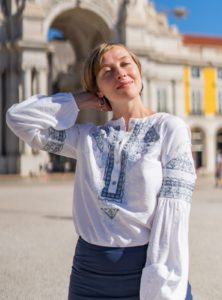Kseniya Moshykhina

The first year in the program was not easy but very exciting. The fifth cohort began its year during the coronavirus pandemic. Although the restrictions were not as severe as the previous year, our first semester had a hybrid form of studying, and we had classes both online and in person. Nonetheless, during the summer semester, we had only in-person classes, and it was interesting to try both formats.
One of the most significant advantages of the program is an individual approach to student learning. It is possible due to the small group size. For example, there are only ten people in our cohort. It allows us to discuss a lot during classes, ask questions, explain and defend our points of view, and develop our analytical and communication skills. In the first semester, we received an extensive base in anthropology and cultural studies, which allowed us to consider and study the decision-making processes through culture. Our curriculum had mandatory classes, mostly related to anthropology and cultural studies, and elective ones about political science, economics, sociology, etc. It benefited those who wanted to focus more on decision-making in these fields.
What is also fascinating is that the program gives the opportunity of learning not only in class but also outside. Out of ten people in our cohort, there are not even two people from the same country. During our everyday communication, we received much practical cross-cultural knowledge. We shared different perceptions of the same things, learned to understand each other, and talked about our countries and local customs. Therefore, it is not surprising that we have such a friendly atmosphere in the program, and we can always rely on each other.
SDAC also has a mentoring program, which makes it possible to choose one of the teachers as your mentor, which is useful, especially for those who do not feel confident in the academic environment. The teaching staff is always ready to help you to figure out what is unclear.
Another thing that was especially important to me was support. I felt terrible and baffled when a full-scale war broke out in my country. My mentor and other professors have helped me a lot during this difficult time. I felt a lot of support, which gave me the strength to continue the program no matter what.
